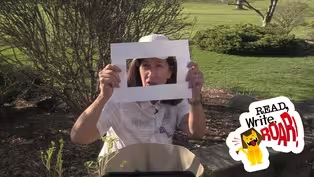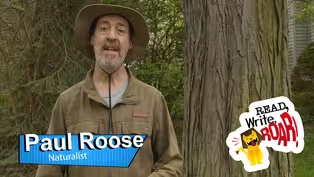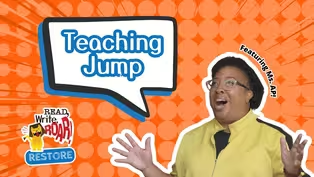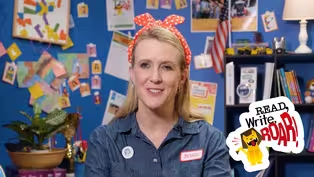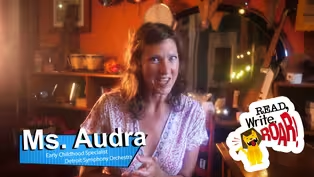Read, Write, ROAR!
Michigan Farmer: A First-Person Narrative | Jeff Kass | Read, Write, ROAR!
Clip: Season 1 Episode 1001 | 6m 6sVideo has Closed Captions
What’s it like to be a farmer in Michigan?
What’s it like to be a farmer in Michigan? Jeff Kass takes us into the world of organic farmers and teaches us how to write a first-person narrative from their perspective. Learn how to explore the world through someone else’s eyes and share their challenges and joys. Ready to get your hands dirty with writing? Let’s dig in!
Problems playing video? | Closed Captioning Feedback
Problems playing video? | Closed Captioning Feedback
Read, Write, ROAR! is a local public television program presented by Detroit PBS
Read, Write, ROAR!
Michigan Farmer: A First-Person Narrative | Jeff Kass | Read, Write, ROAR!
Clip: Season 1 Episode 1001 | 6m 6sVideo has Closed Captions
What’s it like to be a farmer in Michigan? Jeff Kass takes us into the world of organic farmers and teaches us how to write a first-person narrative from their perspective. Learn how to explore the world through someone else’s eyes and share their challenges and joys. Ready to get your hands dirty with writing? Let’s dig in!
Problems playing video? | Closed Captioning Feedback
How to Watch Read, Write, ROAR!
Read, Write, ROAR! is available to stream on pbs.org and the free PBS App, available on iPhone, Apple TV, Android TV, Android smartphones, Amazon Fire TV, Amazon Fire Tablet, Roku, Samsung Smart TV, and Vizio.
Providing Support for PBS.org
Learn Moreabout PBS online sponsorshipDid you know there are over 10 million acres of farmland in Michigan?
Did you know there are over 1000 dairy farms and 430,000 cows?
That's a lot of cows.
But the life of a farmer is a lot more than numbers.
It's about people who dedicate their lives to developing a relationship with the land they live on.
Hi everyone.
I'm Jeff Kass, and today we're going to explore the lives of Michigan's organic farmers by experiencing things from their point of view.
I want us to think about that concept a bit more.
It's valuable to look at the world from different positions because our eyes get open to different ideas.
When reading books, we call this an opportunity to have a window into a life or culture, rather than always seeing a mirror of our own perspective.
For example, I'm a 57 year old high school English teacher in the Midwest.
I don't really understand why people walk around with one earbud in their ears.
In fact, I call earbud fishhooks and imagine my students are big, fat rainbow trout.
We're being reeled in by some all seeing monster sized fisherman.
But what if I tried to look at that issue through the eyes of a teenage boy, and try to imagine why it actually is that he walks around with one earbud in his head at all times?
Maybe he's going through a difficult experience and just needs to listen to some music to get a better mood.
Maybe he's on his way to a big basketball game, and he's trying to psych himself up by putting myself in his shoes, or more precisely, his ears.
Maybe I would come to understand his point of view better, and I wouldn't be so opinionated.
Let's try that with Michigan farmers.
Let's try to write a first person narrative from the point of view of a farmer, but we won't give it a strict form.
We'll speak in that farmer's voice and just say our thoughts aloud.
How will we know when an organic farmer might be thinking, well, we have to find out.
As I research, I'll try to find answers to some of the questions I have about the lives of organic farmers, like what are some of the challenges they face?
What are some of the things we're really proud of?
What are their favorite parts of daily life?
What do they wish they could change about their lifestyle?
These are all good questions to ask when you're learning about another person's point of view and trying to speak in their voice.
Now let's talk about some elements of first person narratives.
First, we want the speaker to express a specific idea.
They're not just talking for no reason.
Second, we want to have an interesting opening, like some way of grabbing a reader's attention at the beginning as if they were the kind of fat rainbow trout I was talking about earlier.
We want to hook them and get them on the line.
Finally, we want to finish our narrative with parting words that close out the piece with emphasis.
So I've done some research about contemporary organic farms.
These are specialized farms that try to avoid using chemicals when growing crops.
I will now attempt to speak from the point of view of an organic farmer in Michigan in 2024.
If you want to be a farmer like me, you have to love dirt.
I get dirt everywhere on my clothes, in my hair, and most of all on my hands.
I love the feel of my hands sunk into earth.
I believe that dirt is magic, that if I treat it right, I can grow something beautiful, something that will feed people and make them grow to.
My favorite thing to grow his garlic.
Not because I think it'll keep vampires away though.
That's definitely a plus, but because I love how it makes food taste.
How you can mix it into soup for an omelet, sprinkle it onto steak or fish, or mix it into pasta.
Trust me, garlic will do your taste buds right.
It's healthy.
Too good for your heart.
Here's what I mean about dirt.
Garlic likes loose, well-drained soil.
Nothing too muddy or too hard packed.
You have to find the right mix.
Like a DJ at a dance.
Play the wrong song.
You'll clear the floor.
Play the rights of everyone gets hyped.
Same with dirt.
Use the right soil.
The garlic gets hyped.
Plant in the fall.
Right around Halloween.
Just in time to scare the vampires.
Place the cloves about three inches deep.
The pointy end up about six inches apart.
Each individual clove will grow its own garlic head.
The bigger the clove, the bigger the head.
The cloves will develop deep roots during the winter and will start to sprout in April or May, and will even pop up if there's still snow in the ground.
Garlic is tough.
What are the leaves?
Once a week through late June?
You should be able to harvest in July to dig it out.
I'm going to have to get my hands dirty, scoop carefully under the head to break his roots and lift it from the garden, but keep it out of direct sunlight.
I could eat it right away raw, or chop it up and put it into a salad or or throw it into a stir fry.
Yum.
I don't need chemicals.
I don't need pesticides.
I just gotta love dirt.
Okay, now it's your turn.
Do some research about organic farmers or another kind of farmer you're interested in, and learn more about their experiences.
Then write a first person narrative from their point of view.
Aim for at least half a page.
Try to really imagine a farmer's experience and speak in that person's voice.
Be a farmer.
Have fun.
Get your brain dirty.
Love the dirt.
Media Literacy & Camera Shots: Telling Stories Through Film | Ms. Kara | Read, Write, ROAR!
Video has Closed Captions
Clip: S1 Ep1001 | 4m 14s | Learn about different camera shots like establishing shots, medium shots, and close-ups. (4m 14s)
Nature Journaling 101: Birdwatching with a Naturalist | Paul Roose | Read, Write, ROAR!
Video has Closed Captions
Clip: S1 Ep1001 | 4m 22s | Join naturalist Paul Roose as he takes you birdwatching and shows you how to start your own nature j (4m 22s)
Read, Write, ROAR! Restore - Teaching Jump
Video has Closed Captions
Clip: S1 Ep1001 | 1m 54s | Powerful Pencil Jumps: Jump into action with Ms. AP in this 2-minute movement snack. (1m 54s)
Rosie the Riveter - Writing Using Multiple Sources| Mrs. DeFauw | Read, Write, ROAR!
Video has Closed Captions
Clip: S1 Ep1001 | 5m 37s | Watch as Mrs. DeFauw models how to take notes and write summaries to help remember key ideas. (5m 37s)
Symphony Soundscape | Make Music with Ms. Audra | Read, Write, ROAR!
Video has Closed Captions
Clip: S1 Ep1001 | 1m 57s | Become the conductor of your very own symphony! (1m 57s)
Providing Support for PBS.org
Learn Moreabout PBS online sponsorship

- Home and How To

Hit the road in a classic car for a tour through Great Britain with two antiques experts.












Support for PBS provided by:
Read, Write, ROAR! is a local public television program presented by Detroit PBS
